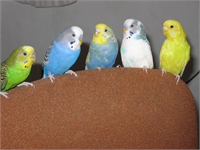
When Does Your Small Bird Need Vet Care?
Important Notice: Our web hosting provider recently started charging us for additional visits, which was unexpected. In response, we're seeking donations. Depending on the situation, we may explore different monetization options for our Community and Expert Contributors. It's crucial to provide more returns for their expertise and offer more Expert Validated Answers or AI Validated Answers. Learn more about our hosting issue here.

When Does Your Small Bird Need Vet Care?
You must be logged in to post a comment.
Small companion birds are very popular pets for first time pet owners, and with good reason! Their appealing colors and funny antics make them great fun to watch, and they take up less space than dogs or cats. When cared for properly, birds like budgerigars (parakeets in America), lovebirds, the various other parakeet species and doves can all make wonderful pets. It is, however, very important that an owner learns to care for his or her bird properly. One of the most important and challenging tasks is learning to spot the signs of sickness in birds.
Detecting and diagnosing illness in your bird can be very difficult because birds are prey animals and instinctively hide illness. Until a bird is feeling very poorly, he will try to behave as normally as possible, and only an owner who knows his bird’s activity pattern and pays close attention will notice anything different. Even when a bird can no longer disguise his illness, it’s hard to tell exactly what’s wrong. Aviculturists (people who raise birds) describe this phenomenon as "Sick Bird Syndrome." Though birds are susceptible to many illnesses, they tend to display only one set of symptoms, referred to as Sick Bird Syndrome. It will usually take a veterinary examination and blood tests to determine what the illness is and how to treat it. If your bird begins to display symptoms of Sick Bird Syndrome, you should get him to the vet soon, because it’s likely he’s been sick for awhile. If he has one of a few specific symptoms, you must get him to the vet right away, or he could die.
See a vet soon if your bird has one or more of these symptoms:
See a vet immediately, even an emergency vet, if your bird displays any of the following symptoms:
Remember, if you are in doubt as to whether your bird needs a vet, you should call your avian vet and ask for advice. Your vet is an invaluable resource when it comes to caring for your bird. This is a major reason why it is important to get your bird a checkup once a year. You will have a good relationship with your vet, and your vet will know your bird and have a chart in case your bird ever gets sick or injured.